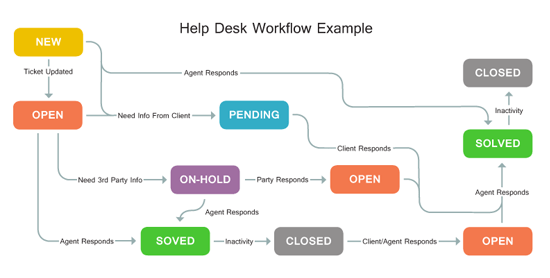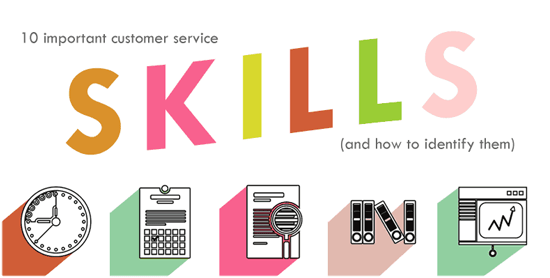-
15 Secrets of Leading Customer Service Departments
Tue, 20 Feb 2018, in Leadership

Customers want one, well, two things above else. They want to save time and money. And since our online experiences have improved in strides, we expect that making research and buying a convenient and personalized process.
How can your support team take this customer service “know how” and apply it to their work? That’s something we wanted to figure out for ourselves. So we looked back at our most popular and memorable posts of the year to better answer that question.
What Makes a Great Customer Service Department
1. They decide on the right customer service strategy
It’s difficult to settle on a customer service strategy out of the blue. First, determine what your customers want. What expectations you’d like to set for them and how to meet them. We created a helpful checklist to help you with this: 20 tips for a better customer service strategy.

2. They pick the right customer service tools
Without the right customer service tools, it’s difficult to reach your support goals. In this post we narrowed down the questions you should ask yourself and the implementation road maps to consider to pick your next help desk software. Read more on picking help desk software that’s right for you.

3. They hire the right customer support employees
Employees are the lifeline of any support department. They should be able to clear up misconceptions and diffuse difficult situations with their superior communication and listening skills. Here are the most important skills to look for in customer support employees.

4. They empower everyone to do great things
Giving up responsibility isn’t easy. Since your support agents deal with customers day in and day out, they should have adequate decision-making ability to go above and beyond customer expectations. We explore how to inspire employees to offer great customer service.

5. They know how to start, carry and end conversations
Email skills are the new communication skills. Forgetting to brush up on these skills can leave you in the dust, particularly in the fast-paced and quickly evolving world of customer service. We created the most definitive email guide (after analyzing quite a lot of emails!)

6. They identify and encourage loyal customers
Customer loyalty doesn’t come easy – but when it does, how do you scale it? How do you connect with customers and build long-term relationship with them? We explore the hidden ROI of customer loyalty.

7. They don’t make mistakes in support
Customers are well aware when businesses aren’t able to meet their expectations. Often, they don’t make much noise or complain about things. Instead, they quietly leave for your competitors. Here are 25 worst customer service mistakes not to make.

8. They know how to resolve difficult situations
No matter the problem your customer is faced with, they expect a quick, thorough answer and (hopefully) some good news. Skilled support representatives know how to turn every difficult situation around. Here are a few difficult customer service situations and how to solve them.

9. They routinely say thanks and show appreciation
There’s a million ways of saying thanks, but it’s actions that have the potential of winning the hearts and minds of your customers. We asked 30 different businesses how they thanked their customers in creative ways, and their answers blew us away. Check out the complete list of customer appreciation ideas here.

10. They align their messaging to customer expectations
True customer sentiment is difficult to measure. In this post we differentiate between a mediocre and an outstanding and memorable support experience. What are the characteristics and repercussions of each? We explore how to narrow the customer expectation gap.

11. They understand the importance of human emotions
Successful sales professionals know how powerful emotional attachment is, particularly when it comes to brands. Yet many support teams don’t consider the role of emotions during the purchase experience. We examine where human emotions fit in the customer experience.

12. They allow customers to help themselves
Sometimes you need to leave customers to their own devices. This includes offering them multiple self-service options and appearing only when when called upon. Smart support representatives understand that sometimes customers stay silent and aren’t keen on being bothered.

13. They listen to the collective voice of the customer
When customers have an opportunity to speak out, companies have an opportunity to listen. This raises accountability of those in the company and increases customer satisfaction. Here are the things that you should ask yourself before starting an online community.

14. They understand the customer’s point of view
What you think the customer thinks may not always correlate to what’s happening on the ground. Keeping in touch with how your words, actions and even intentions may be interpreted is important. Learn more about why customer service is more perception, less reality.

15. They’re not afraid to go above and beyond
There are times when you must break all the rules in order to set yourself apart. That’s why we’d like to leave you with a story about how one ice cream shop “customer hacked” its way to success.

Your team is your greatest asset.
Nowadays, customer service is a lot more than a “department” or a means to an end.
Making customers feel valued does more than get them to stick around. It will also give them solid reasons to spread good words about you. Getting your team on your customer’s good side will help your organization reach greatness.
Tags: leadership
